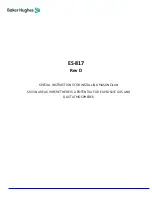
The two-position cylinder is a positioning device controlled by a
three-way (single-acting model), two-position, control valve such as
the “A” or “D” PILOTAIR® VALVE. The cylinder has a wide range of
applications, being particularly suited for shifting transmissions and
positioning hydraulic valves. It is corrosion-resistant and
constructed of lightweight, die-cast, anodized aluminum heads,
pistons and body.
Cylinders with return springs can be used for infinite positioning,
similar to an actuator, by selecting the proper graduating pressure
control valve (see Catalog SC-700/800 for CONTROLAIR® VALVE
and FLEXAIR® VALVE). To select the required pressure range of
the control valve, see the graph shown under “Available Forces” on
Page 4.
Maximum stroke of the piston rod for each cylinder is shown in the
table under “Outline Dimensions” on Page 3, with shorter strokes
available in 1/16-inch (1.6mm) increments only. External envelope
dimensions do not change. The complete part number and the part
number of the piston stop (10) for each cylinder will have an
identical four-digit suffix. The first digit is always zero or whole
inches; the last three digits show the stroke in thousandths of an
inch.
WARNING: INSTALLATION AND
MOUNTING
The user of these devices must conform to all applicable electrical,
mechanical, piping and other codes in the installation, operation or
repair of these devices.
INSTALLATION!
Do not attempt to install, operate or repair these
devices without proper training in the technique of working on
pneumatic or hydraulic systems and devices, unless under trained
supervision.
Compressed air and hydraulic systems contain high levels of stored
energy. Do not attempt to connect, disconnect or repair these
products when a system is under pressure. Always exhaust or drain
the pressure from a system before performing any service work.
Failure to do so can result in serious personal injury.
MOUNTING!
Devices should be mounted and positioned in such a
manner that they cannot be accidentally operated.
INSTALLATION
Because cylinders are installed at the end of an air system, they are
vulnerable to dirt and moisture carried through the air lines. Therefore,
before installing the two-position cylinder, all air lines in the system
should be blown clean. It is recommended that the cylinder be mounted
with the ports facing down. Gravity can then assist in preventing foreign
material from accumulating in the cylinder by removing It through the
control valve exhaust.
OPERATION
Maximum operating pressure of the two-position cylinder is 150 psi (10.3
bar) at a temperature range of –40° F to 180° F (-40°C to 82°C). On the
single-acting model, supply pressure from a three-way control valve is
piped through the Cap-End Port to move the piston rod to its extended
position. When air pressure is exhausted, a spring returns the piston rod
to its retracted position.
On the double-acting model, the return spring is omitted, and a four-way
control valve is used. Pressure supplied to either the Cap-End or Head-
End Port will force the piston rod to its extended or retracted position,
respectively.
MAINTENANCE
Periodically disassemble the cylinder for cleaning, inspection and
lubrication. Clean all metal parts with a nonflammable solvent, and
wash all rubber parts with soap and water. Rinse thoroughly and
blow dry with a low-pressure air jet. Replace those parts which are
damaged or worn.
Reassemble the cylinder, using the exploded and assembly views
as reference. No special tools are required. To avoid cutting or
nicking the piston “O” ring, carefully insert the piston rod assembly
into the cylinder bore with the piston tilted at a slight angle. As the
assembly proceeds, lubricate all “O” rings with Pure Golden Grease
No. 2 (Union Oil Co. AAR M-914) or equivalent.
Multi-position Air Cylinder
Cast Aluminum
Two-Position
Single-Acting—Double-Acting
Service Information
SM-1000.43












